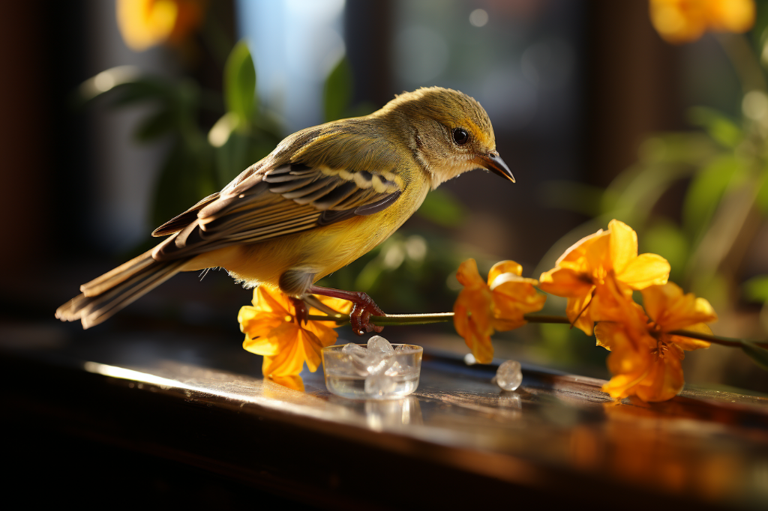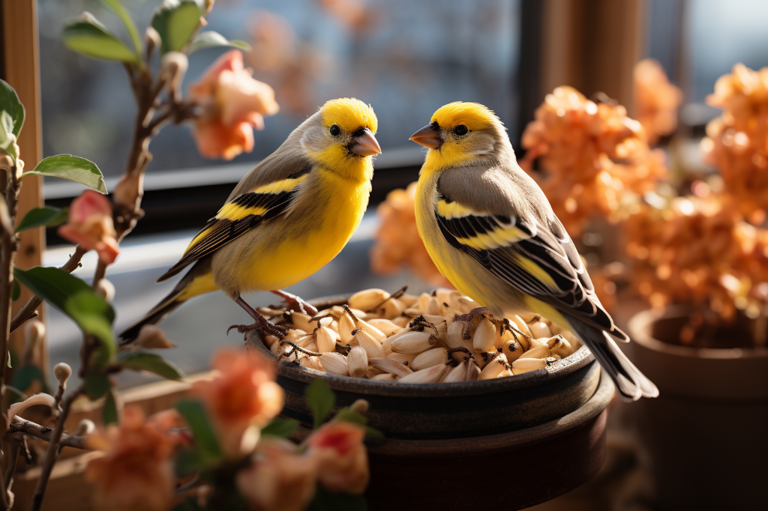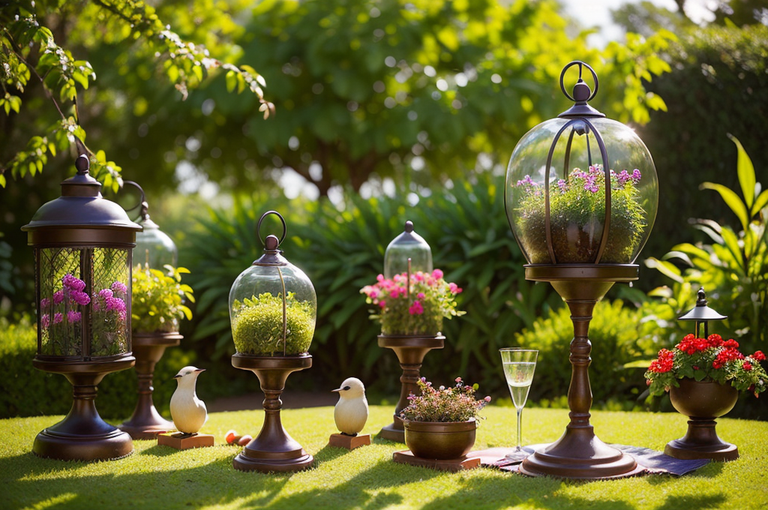Feeding Your Garden Birds: The Benefits and Precautions of Using Oats

Oats make ideal bird feed due to their high nutritional value, pleasing bird species such as blackbirds and blue jays. However, cooked oats can harm birds, and preferable feeds may lead to neglect of oats.
The Power of Oats: A Vital Bird Feed
Morning bird watchers, let’s delve into oats, a staff of life for our feathered friends. As the sun brushes away the night, hitch a ride with me on this fascinating exploration of why oats are the unsung heroes of bird feed.
A Closer Look: Nutrient Profile of Oats
Here’s a surprising fact like a deceptively simple sonnet revealing profound truths, oats conceal a wealth of nutrition in their humble kernel. They’re teeming with slow release carbohydrates, protein, fats, B vitamins, zinc, and magnesium. Now, doesn’t that just sound like a vital powerhouse for our industrious birds? 🐦💪 Without a doubt, oats ensure the health meter of wild bird mites and other feathered friends ticks high.
Winters and Oats: A Lifeline for Birds
In the shivering heart of winter when foraging becomes a tale of survival, oats are nothing short of a lifesaver for our chilly chirpers. Laden with protein and valuable calories, oats are the proverbial life raft during lean months. Like a determined snow plow, oats clear the path to survival with their nourishing goodness. ❄️
The Bird Magnet: Attracting Diverse Species with Oats
So, what do blackbirds, blue jays, cardinals, and sparrows have in common, besides their inheritance of wings? Their love for oats of course! Strewing a little bit of those golden grains can convert your backyard into a veritable symphony of nature’s choir. 🐦🎼
Thus, in a world of bird feed, oats reign undisputed. Like the silent flight of an owl in twilight, the importance of oats passes unnoticed for many. But stoop down, peer closer, and you’ll recognize the unheralded ambrosia for what it truly is a cornucopia of nourishment for our winged friends. Life, it seems, weaves its magic even in a humble grain of oats.

Choosing the Right Type of Oats
As an ornithologist and an avian enthusiast, I find myself often asked, what can you feed wild birds? I smile every time, eager to impart the nuggets of wisdom I’ve acquired over the years. If oats are on your mind, you’re thinking along the right lines! They provide a balanced dose of nutrients essential for our feathery friends.
Suitable Types of Oats for Birds
Birds can safely consume a variety of oats. These include rolled oats, admired for their gentle, digestible texture. Then there’s steel cut oats, processed minimally to retain their wholesome nutrient profile. Jumbo oats and pinhead oats are also worth considering. Their larger size provides a fun, foraging challenge for the birds.
Types of Oats to Avoid
While most oats are a thumbs up, there are a few to be wary of. Instant porridge pots or sachets can sometimes contain additional ingredients such as sugar and milk powder. These might not necessarily harm birds, but they are certainly not the best options. With birds, it’s always safe to stick to the wholesome and natural.
Importance of Pesticide-free Oats
And finally, let’s touch upon the question of pesticides. As a rule of thumb, aim for 100% pure oats that are free from pesticides. Remember, the health of the birds is paramount and they deserve to savour the earth’s offerings in their pristine form, as nature intended.
There you have it – a little guide to help you navigate the world of oats for our winged companions. Look at oats through the clear lens of a bird loving poet cum scientist and you’ll be offering avian fine dining in no time. They’ll thank you with lively chirps and merry flutters, a symphony you’ll carry in your heart forever.

Feeding Oats to Birds
Warming up your wintry mornings, I often experience pure joy sprinkling oats on the ground as part of my dawn routine. Embedded within this simple act is an essential question that bird enthusiasts often ponder: what can i feed wild birds? Well, oats are a delightful choice!
Ideal Method of Feeding
Now, oats and birds together construct an interesting tale. Sprinkling oats directly on the ground is not just a simple act of tossing breakfast reminants. Rather, it’s an art, a dialogue between me and my feathered friends. Harmonized with the morning symphony of chirping, this act becomes crucial for their nourishment those misty mornings.
Mixing Oats with Other Feeds
Whilst oats alone are nutritious, it’s key we make it more appealing for our avian mates. Hence, an assortment of seeds, nuts or dried mealworms stirred in with oats creates an irresistible all you can eat buffet for them. Oats, combined with this varied diet, suddenly transforms from being discounted to delectable, aiding in maintaining a balance of nutrients essential for their health.
The Harm of Cooked Oats
However, a word of caution for all bird enthusiasts. As fortifying as they are, cooked oats are a perilous feast. Imagine morsels of food sticking menacingly to their delicate beaks – a sight nobody cherishes. So, even though it may seem comforting, especially during frigid temperatures, offer oats raw and unadorned. These simple gestures of ours will ensure their safe sustenance.
Being captivated by the avian world and serving oats isn’t solely an act of feeding wild birds. It’s a tremendous opportunity for us to delve into their enchanting lives and understand, appreciate, and safeguard these marvelous creatures. And we achieve this by being mindful of even the tiny details, like the way we serve their oats.

Need for Fresh Water
The perfect symphony of dawn entails the enchanting chorus of birds exulting in the crisp, morning air. As an ornithologist and a steadfast observer of these feathered wonders, I’ve found that their triumphant melismas are only possible due to two essential elements – food and fresh water.
Importance of Proper Hydration for Birds
Beyond the basic need of feeding, one of the paramount concerns for our avian friends is fresh, clean water. Hydration, like their melodic narratives, are all part of why birds thrive – a truth as clear as a mountain spring. It’s not just about quenching their thirst; water is imperative for their routine preening, which keeps their feathers in prime condition for flight too.
From the diminutive robin to the stately eagle, each bird is a love letter to life and its inherent wonders. Just as can wild birds eat oatmeal? is a question of dietary necessities, the requirement of water veers towards their overall wellness.
Positioning of Water Source
Location too plays a role in ensuring our feathered companions enjoy a sustainable water supply. Keeping the water source close to their feeders can make all the difference; it’s an open invitation for them to drink and bathe at their leisure. This careful positioning is a small effort from our end for ensuring the overall health and happiness of these captivating creatures.
Understanding the avian need for fresh water has cemented my perspective on the intricate design of nature. Every bird, every warbling song, every meticulous preen, is a testament to this meticulous design. And within this symphony of chirps and feathers, it’s our privilege to play a helpful tune.
Key Takeaways
Benefits of Oats as Bird Feed
Among the wild bird mites and the many challenges our feathered friends face daily, sustaining nutrition stands paramount. As an ornithologist and bird enthusiast, I am often asked, What can you feed wild birds? My answer invariably points to one of nature’s most undervalued gem oats. Feeding wild birds, you see, is an art that marries nutrition with attractiveness, and oats perform this duet particularly well.
After all, it is the nutrition profile of oats, studded with necessary proteins and fibers, that transforms them into an excellent bird feed. Best of all, oats seem to be universally appealing, attracting a variety of bird species to your yard.
Best Practices in Choosing and Serving Oats
Now, What can I feed wild birds? transforms into ”How can I feed them?” When it comes to oats, I stress on the importance of pesticide free selection. The absence of harmful chemicals safeguards bird health while the serving style ensures optimal digestion and acceptance. It’s always best to serve oats uncooked, blending them seamlessly with other feeds. This diverse meal will satisfy and satiate wild birds, keeping our avian friends returning for more.
Importance of Fighting Hydration Alongside Feeding
At the risk of sounding overly dramatic, I argue: Can wild birds eat oatmeal? Yes, but with careful consideration. When providing oatmeal, the key factor to remember is hydration. Maintaining a nearby water source is as crucial as the provision of feed itself. Not only does water aid digestion, but it plays a vital role in protecting the health and ensuring the survival of birds.
The knowledge that we, as custodians of nature, can contribute to the wellbeing of our wild bird population is deeply satisfying. A little thoughtfulness towards selecting and serving feeds, and remembering to provide water alongside, can go a long way in fostering our winged companions. It’s a silent pact of care, respect, and love between us and the avian world.


